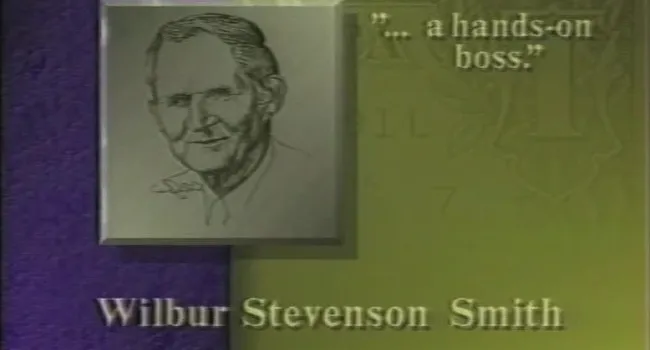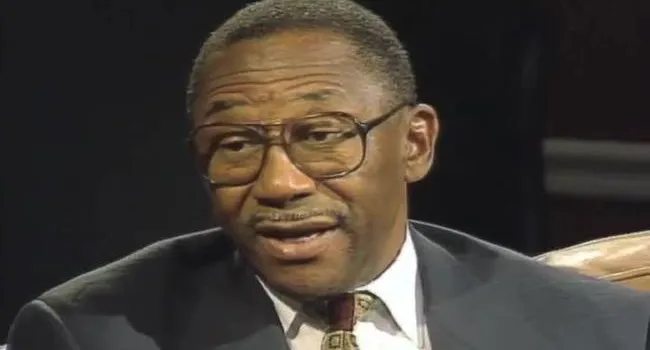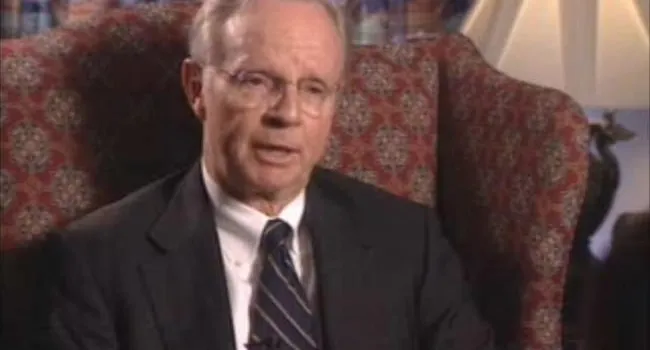William J. Detyens (1917-2002)
Bill Detyens has lived in semiretirement much as he has lived the rest of his life: full speed ahead. He could be at his Rebellion Farms home or office on Clements Ferry Road at Wando or he could be sailing his 62-foot ocean-going sloop in the Caribbean, wing shooting in Argentina, or perhaps flyfishing in the waters of Alaska or the Bahamas.
While his excessive energy and curiosity often worked to his disadvantage as a youth, those very traits helped propel him to success in the years that have followed, first as a merchant seaman and later as owner of Detyens Shipyard, which had gross sales of $24 million and 450 employees in 1983, the year he sold the business for millions to two of his employees.
William James Detyens was born March 21, 1917, in Georgetown, the son of Hasford Walker and Sally Marie Cox Detyens. In 1920, his father, a carpenter, moved the family to Charleston. "W. J.," as Bill Detyens was called as a child, enjoyed the companionship and tutelage of an older brother and sister.
With his boundless energy and curiosity, he found school boring, but he was industrious otherwise. In his early teens, Detyens joined the Merchant Marine Service, starting with the lowest job aboard ship. He served in various positions, furthering his education through extensive studies while at sea.
Through his self-improvement program, he passed examinations qualifying him for a marine engineer's license, and at age 27, he was qualified and licensed to serve as a chief engineer on any size oceangoing vessel.
During World War II, he was a member of the Army Transportation Corps and held a rank equivalent to colonel. In 1950, he resigned from the Maritime Service to join the United States Pipe and Foundry Corporation in Chattanooga, Tennessee, as a methods engineer. He worked in Chattanooga for about a year, but the lure of the ocean was too strong.
Back in Charleston, he started his own business as a marine surveyor and consultant. He also owned and operated part-time the Lighthouse, an Isle of Palms bar and landmark.
In 1956, Detyens opened a small ship repair facility at Laurens Street in Charleston adjacent to the Cooper River, with about $5,000 in working capital and equipment. The business was an immediate success.
In 1957, his business outgrew the Charleston facility, so he purchased a 72-acre tract on Beresford Creek, a bold estuary of the Cooper-Wando rivers. There, larger, improved facilities were constructed at a cost of about $150,000.
Within three years, the Beresford Creek Yard had become too small to adequately handle Detyens' ship repair business, so he leased from the city of Charleston a Calhoun Street site. When the city decided to build a yacht basin at that Calhoun Street site, Detyens bought an 18-acre tract of land on the Wando River, and Detyens Shipyard was established. The company was incorporated in 1961. At the time it employed about 200 workers.
Detyens also founded Berkeley Industries, Inc., which leased equipment to the ship repair business and other businesses associated with the shipyard. He also founded Mount Pleasant Memorial Gardens and was a partner in Detyens, Simmons & Carlisle, developers of Dockside Condominiums.
While he worked hard, Bill Detyens placed a high priority on family life and the pursuit of personal interests. He taught his children to swim, sail, and shoot. And he pursued his own diversions: hunting, fishing, sailing, riding and training horses, fox hunting, and playing golf. But ocean racing in sailboats brought him the most pleasure.
He began with small boats, racing locally, graduated to catamarans, and finally bought the 45-foot Wando Lady, which required a crew of at least nine. He was the skipper and competed with some of the best sailors in the world. Eventually, he left ocean racing to younger sailors, but his love for the ocean and sailing have never diminished.
A member of First Baptist Church, Detyens helped in the development and operation of the First Baptist Church School and served on its board. He also helped fund the school's gymnasium.
He was a founder of Baptist College of Charleston, which initiated the night school higher education concept in the Charleston area. His guidance and financial support helped make the Baptist College Chapel a reality. In 1982, Baptist College of Charleston awarded him an honorary doctoral degree.
Detyens had a leading role in the creation of Trident Academy, an ungraded school for dyslexic children and served on the school's board of trustees for four terms. An academic building is named for him.
Many nonprofit organizations in the Trident area have benefited from Detyens' benevolence, including rural churches to which he donated organs, Ashley Hall Foundation, Medical University of South Carolina, Boy Scouts, Bishop England Building Fund, Ronald McDonald, Roper Hospital Endowment, and East Cooper School, which named a building for him.
He was first married to Florence Mood, and they were the parents of a son, William Ronald "Billy" Detyens. He and his second wife, Marjorie Alice Greene, were the parents of five children, Judy Ann, Margaret Ann, Mary Alice, Hasse Harold, and William James II. Marjorie died after a long illness, and in 1993, he married Susie Schleppegrell Small.
Detyens was inducted into the South Carolina Business Hall of Fame in 1995.
William J. Detyens died June 6, 2002
© 1999 South Carolina Business Hall of Fame




